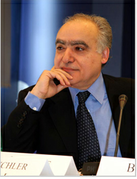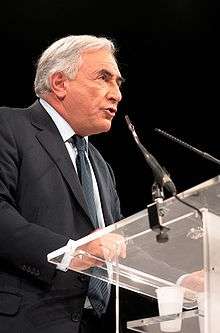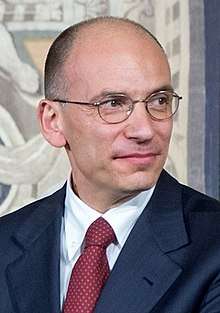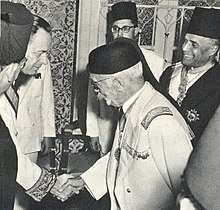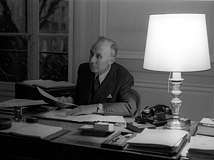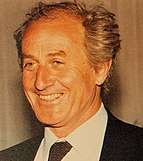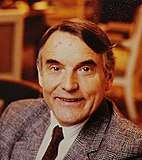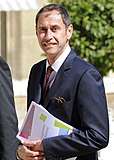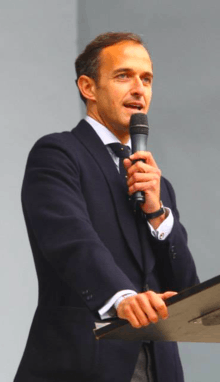Sciences Po
The Paris Institute of Political Studies (French: Institut d'études politiques de Paris, IPA: [ɛ̃stity detyd pɔlitik də paʁi]), commonly referred to as Sciences Po Paris or just Sciences Po (IPA: [sjɑ̃s po]), is a higher education institution located in France, and member of the Conférence des Grandes écoles.[3] It was founded in 1872 to promote a new class of French politicians in the aftermath of the French defeat in the Franco-Prussian War.[4] Sciences Po is commonly ranked as one of the best universities for political science and international studies in the world.[5][6] As a grand établissement (together with the École des hautes études en sciences sociales (EHESS) or the Collège de France) it is one of the most prestigious institutions of higher learning in France.
Sciences Po | |
Former names | École libre des sciences politiques |
|---|---|
| Type | Public Higher Education Research Institution, Grande École[1] |
| Established | 1872 |
| Budget | €197 million |
| President | Frédéric Mion |
Academic staff | 216 |
| Students | 14,000 |
| Undergraduates | 4,000 |
| Postgraduates | 10,000 |
| Location | , (France) |
| Campus | Urban |
| Affiliations | Association of Professional Schools of International Affairs, Couperin consortium[2] |
| Mascot | The lion and the fox |
| Website | sciencespo.fr |
The school's alumni include many prominent figures of the French and international economic and political elite. Seven recent French presidents, 13 French prime ministers, 12 foreign heads of state or government, and six of the CEOs of France's largest companies have studied at Sciences Po.
Sciences Po undertook a substantial reform agenda starting in the mid-1990s, which broadened its focus to prepare students for the private sector, internationalized the school's student body and curriculum, and established a special admission process for underprivileged applicants. Sciences Po also expanded outside Paris by establishing additional campuses in Dijon, Le Havre, Menton, Nancy, Poitiers, and Reims. The Sciences Po curriculum now incorporates core courses in various branches of the social sciences, such as law, economics, history, political science, and sociology.[7] The institution is a member of the Association of Professional Schools of International Affairs and the Global Public Policy Network.
In the 2020 World University Rankings, Sciences Po was ranked 2nd worldwide for politics and international studies (behind only Harvard University and tied with Princeton University).[8]
History
1872 to 1945: École Libre des Sciences Politiques
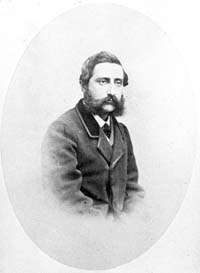
Sciences Po was established in February 1872 as the École Libre des Sciences Politiques (ELSP) by a group of French intellectuals, politicians and businessmen led by Émile Boutmy, and including Hippolyte Taine, Ernest Renan, Albert Sorel and Paul Leroy Beaulieu. The creation of the school was in response to widespread fears that the inadequacy of the French political and diplomatic corps would further diminish the country's international stature, as France grappled with a series of crises, including the defeat in the 1870 Franco-Prussian War, the demise of Napoleon III, and the upheaval and massacre resulting from Paris Commune. The founders of the school sought to reform the training of French politicians by establishing a new "breeding ground where nearly all the major, non-technical state commissioners were trained.".[9]
ELSP proved remarkably successful at preparing candidates for entry into senior civil service posts, and acquired a major role in France's political system. From 1901 to 1935, 92.5% of entrants to the Grands corps de l'État, the most powerful and prestigious administrative bodies in the French Civil Service, had studied there (this figure includes people who took civil service examination preparatory classes at Sciences Po but did not earn a degree).[10] By August 1894, the British Association for the Advancement of Science was advocating for the creation of a similar school to advance the study of politics in Great Britain. One year later, Sidney and Beatrice Webb used the Sciences Po curriculum and purpose as an inspiration for creating the London School of Economics.[11]
1945: the École Libre des Sciences Politiques becomes Sciences Po
Sciences Po underwent significant reforms in the aftermath of France's liberation from Nazi occupation in 1945. The humiliation of France's surrender to Nazi Germany and the collapse of the Vichy regime provided the impetus for a major restructuring of the state's institutions.[12][13]
Charles de Gaulle, as leader of France's Provisional Government, appointed Michel Debré to reform the recruiting and training of public servants. Even though eight of thirteen ministers in De Gaulle's government, including Debré himself, were Sciences Po alumni, a significant reform of the university seemed inevitable, as it had been instrumental in training the class of leaders whom many accused of complacency in face of Nazi aggression. Communist politicians including Georges Cogniot proposed abolishing the ELSP entirely and founding a new state-run administration college on its premises.[14]
Debré proposed the compromise that was eventually adopted. First, the government established the Ecole Nationale d'Administration (ENA), an elite postgraduate college for training government officials. From then on, the Grands Corps de l'Etat were obliged to recruit new entrants from ENA.[15] The change, however, had little impact on Sciences Po's central role in educating the French elite. Although it was now the ENA rather than Sciences Po that fed graduates directly into senior civil service posts, Sciences Po became the university of choice for those hoping to enter the ENA, and so retained its dominant place in educating high-ranking officials.[16]
The reforms also restructured the administration of École libre des sciences politiques (ELSP), by creating two separate legal entities: the Institut d'études politiques (IEP) and the Fondation Nationale des Sciences Politiques (English: National Foundation of Political Science) or FNSP. Both entities were tasked by the French government to ensure "the progress and the spread, both within and outside France, of political science, economics, and sociology".[9] FNSP, a private foundation that receives generous subsidies from the government, manages the IEP de Paris, owns its buildings and libraries, and determines its budget. The two entities work together in lockstep, however, as the director of the school is, by tradition, also the administrator of FNSP. This institutional arrangement gives Sciences Po a unique status, as the school draws much of its resources through substantial government subsidies to FNSP, but does not subject it to many government interventions and regulations, giving it a much higher level of autonomy compared to other French universities and schools.[12] The epithet Sciences Po is applied to both entities, which inherited the reputation previously vested in ELSP.[17]
The public-private nature of Sciences Po, Paris, also distinguishes it from a network of institutes of political studies throughout the country that were inspired by its curriculum, but that do not enjoy the same level of autonomy and prestige, namely in Strasbourg, Lyon, Aix, Bordeaux, Grenoble, Toulouse, Rennes and Lille. They are not to be confused with the seven campuses of Sciences Po in France.
1945 to 1997
Between 1952 and 1969, 77.5% of the ENA's graduate student intake were Sciences Po alumni.[18]
FNSP further strengthened its role as a scientific publication center with significant donations from the Rockefeller Foundation. FNSP periodicals such as la Revue française de science politique, le Bulletin analytique de documentation, la Chronologie politique africaine, and the Cahiers de la Fondation as well as its seven research centres and main publishing house, Presses de Sciences Po, consolidated the university's reputation as a research hub.[9]
The Richard Descoings era (1997–2012)
Sciences Po underwent various reforms under the directorship of Richard Descoings (1997–2012). The school began requiring all its undergraduate students to spend a year abroad, and introduced a multilingual curriculum in French, English,[19] and other languages. Sciences Po also began to expand outside Paris, establishing regional campuses throughout France.
During this period, Sciences Po also implemented reforms in its admissions process. Previously, Sciences Po recruited its students exclusively on the basis of a competitive examination. This system was seen to favor students from prestigious preparatory high schools, largely attended by the children of the French elite. In 2001, Sciences Po founded the Equal Opportunity Program, widening its admissions policy.[20] This program enables the institution to recruit high-potential students at partner high schools in more disadvantaged parts of France who, due to a social, academic, and financial constraints, would not otherwise have been able to attend Sciences Po.[21]
From 2001 to 2011, the proportion of scholarship students at Sciences Po went from 6 to 27 percent[22] with around 30% of all students at Sciences Po currently receiving some form of scholarship.[23]
The reforms Descoings spearheaded were at times controversial, however, and his leadership style came under heavy criticism for "reigning as almighty king"[24] and to implement a "management of fear".[25] A further report by the French Court of Audit in 2012 severely criticized Sciences Po under the Descoings leadership for its opaque, and possibly illegal, financial management, notably with regard to management salaries.[26]
2013–2022: reorganization and development under Frédéric Mion
Frédéric Mion, a graduate of Sciences Po, ENA and École Normale Supérieure and former secretary general of Canal+, was appointed president of Sciences Po on 1 March 2013.[27] His intention to pursue Sciences Po's development as a "selective university of international standing" is detailed in the policy paper "Sciences Po 2022", published in the spring of 2014. The restructuring of Master's study into graduate schools continued with the creation of the School of Public Affairs[28] and the Urban School in 2015 and the School of Management and Innovation[29] in 2016.
In early 2016, Sciences Po updated its governance structure, adopting new statutes for its two constituent bodies: the Fondation nationale des sciences politiques (FNSP) and the Institut d'études politiques de Paris (IEP).[30] This reform is "the most significant since 1945" and clarifies Sciences Po's governance with new rules, which address observations made by the Cour des comptes in a 2012 report.[31]
In late 2016, Sciences Po acquired a new site, the Hôtel de l'Artillerie in the 7th arrondissement of Paris,[32] which it intends to make the new heart of its urban campus and a site of "educational renewal".
In April 2018, Sciences Po students blocked the main entrance to the school in protest against Macron's education reforms which gives public Universities the power to set admission criteria and rank applicants.[33]
In response to the COVID-19 pandemic, Mion announced in May 2020 that Sciences Po would be adopting a "dual campus" system for the upcoming academic year.[34] The school would thus be pursuing its teaching obligations in two prongs:
- A physical campus. Tutorials, seminars, small group meetings, and one-on-one consultations will continue on all of Sciences Po's seven campuses.
- A digital campus. All larger meetings and classes (such as lectures) will be streamed online, likely through a third party platform such as Zoom.
The school has promised that all materials (including recordings of tutorials) will be available online. As such, students who are unable to travel to France will be able to complete their entire year through distance learning.
Campuses
Sciences Po has seven campuses in France, with each specialising in different regions of the globe. Every May, at the end of the academic year, all seven campuses come together for the inter-campus Collegiades de SciencesPo tournament, also known as the MiniCrit. At the tournament, students represent each campus and compete against one another in arts and athletic competitions. Different events include athletic games such as volleyball and football, as well as artistic competitions such as music and dance.[35][36]
Paris campus
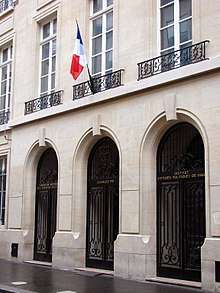
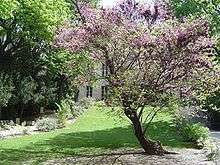
The Paris campus hosts undergraduate students enrolled in the general curriculum programme, the dual bachelor's degree with University College London, as well as all seven of the university's graduate schools. The Paris campus is spread across several buildings concentrated around the Boulevard Saint-Germain in the 6th and 7th arrondissements (districts).[37] The historic centre of Sciences Po at 27 rue Saint-Guillaume houses the head office and central library since 1879. It is also home to Sciences Po's two largest teaching halls, the Amphitheatres Émile Boutmy and Jacques Chapsal. Other buildings include:
- 117, boulevard Saint-Germain: School of Journalism
- 199, boulevard Saint-Germain: Doctoral School
- 174 and 224, boulevard Saint-Germain: offices and classrooms
- 13, rue de l'Université / The René Rémond building: Law School and administrative offices
- 8, rue Jean-Sébastien-Bach: Urban School
- 28, rue des Saints-Pères: Paris School of International Affairs (PSIA)
- 56, rue des Saints-Pères: Language Lab, audiovisual service and a cartography workshop.
- 56, rue Jacob: Research Center for History (Centre d'histoire de Sciences Po) and International Relations (Centre d'études et de recherches internationales)
The Paris campus welcomes about 3,000 undergraduate students, almost a third of whom are international exchange students.[38]
In 2016 Sciences Po purchased the Hôtel de l’Artillerie, a 17th-century former monastery located 200 meters from its campus on rue Saint-Guillaume. The building was previously the property of the French Ministry of Defense and is 14,000 m2 in size. The university has announced its intention to refurbish the building as a major addition to its facilities in Paris. It is estimated that this project will cost around 200 million euros in total.[39][40]
The Hôtel de l’Artillerie will house new facilities for Sciences Po's graduate programs, including a courtroom for the Law School and a newsroom for the Journalism School. It will also incorporate a cafeteria, study areas and accommodation for 50 to 100 students on scholarships.[41]
Frédéric Mion, the director of Sciences Po, stated his intention to create a campus comparable in quality and capacity to Sciences Po's most prominent international partner universities such as Columbia University, the London School of Economics and Hong Kong University.[42]
Work will began at the site in 2018. It is scheduled to open in 2022.[43]
Dijon campus
Located in the region of Burgundy in a magnificent 19th century building, the Dijon campus was created in 2001 and now welcomes around 160 students.[44]
Le Havre campus
Located on the coast of Normandy, Le Havre has hosted the undergraduate Euro-Asian campus since 2007, recently celebrating the 10-year anniversary of the campus in September 2017. The campus welcomes 300 students each year.[45] With a choice between 3 majors, including economics and society, politics and government and political humanities, students primarily choose to spend their third year abroad in an Asian country. Furthermore, Le Havre is home to several Dual Degree programs, and welcomes international students from over thirty countries from all around the world. The Le Havre campus is primarily known for its vibrant campus culture, upholding numerous artistic and sports clubs and celebrating important Asian holidays, such as Diwali and Chinese New Year. Being situated only two hours away from Paris, the students of this campus are especially fortunate to meet with exceptional guest speakers and be taught by remarkable professors.
Menton campus
Established in the French Riviera city of Menton in 2005, the campus is located in an entirely renovated 19th-century building overlooking the Mediterranean. Menton is home to the Middle Eastern and Mediterranean focus branch of Sciences Po and welcomes 300 students each year.[46] Students study in one of two tracks (anglophone/francophone) and may take one of three core Oriental languages (Arabic, Farsi, or Turkish) and an additional concentration language (Italian or Hebrew) if they are fluent in their core language. The third mandatory year abroad is spent in the Middle East or elsewhere. The Menton campus takes part in the dual BA programmes with Columbia University, University College London, the National University of Singapore, the University of British Columbia, the University of California, Berkeley, the University of Hong Kong and the University of Sydney.
Nancy campus
Established in the region of Lorraine in 2000, the Nancy campus is located in a prestigious 18th century heritage site, the Hôtel des Missions Royales. The curriculum is taught in French, English and German, as it focuses on the European Union and French-German relations. The campus welcomes over 300 students each year.[47]
Poitiers campus
Opened in 2010, the campus is located in the heart of the historic city of Poitiers in the Hôtel Chaboureau, a renovated building dating from the 15th century. The academic programme is focused on Latin America and the Iberian Peninsula. The campus welcomes about 200 students.[48]
Reims campus
In the heart of the Champagne region, the Reims campus opened in September 2010. It is housed in the 17th century College des Jesuits. Despite being the most recent campus, it is by far the largest of the regional campuses of Sciences Po, welcoming over 1,600 undergraduate students each year.[49] The Reims campus hosts both the Europe-North America program and the Europe-Africa Program as well as an exchange program. In addition to the traditional undergraduate programs, the Reims campus is also host to several dual degree programs, including ones with Columbia University, the University of California, Berkeley, and the University of British Columbia.
In autumn 2017, a brand new section of the campus, complete with a new cafeteria and amphitheatre was opened to accommodate even more students.
Education
The academic bodies of Sciences Po consist of the Undergraduate College, six professional schools, and the Doctoral School. The university also contains a library system, the Presses de Sciences Po, and holds ties with a number of independent academic institutions, including Bocconi University, Columbia University, King's College London, the National University of Singapore, and the Sorbonne Paris Cité alliance.
Undergraduate level
The Sciences Po Undergraduate College offers a three-year Bachelor of Arts degree with a multidisciplinary foundation in the humanities and social sciences with emphasis on civic, linguistic, artistic, and digital training.[50]
On all campuses, students choose a multidisciplinary major – Politics & Government, Economies & Societies, or Political Humanities. In addition, each campus offers a different regional specialism which anchors students' intellectual objectives, the regions are: Africa, Asia, Europe, Latin America, Middle East-Mediterranean, and North America.
Sciences Po offers dual bachelor's degrees with Columbia University, Keio University, University College London, Freie Universität Berlin, University of British Columbia, the University of Sydney, the National University of Singapore, the University of Hong Kong, University of California Berkeley.[50]
The current dean of the Undergraduate College is Stéphanie Balme.
Graduate level
At the graduate level, Sciences Po's seven schools offer one- and two-year Master's programmes and PhD programmes. All graduate programmes are delivered on the Sciences Po campus in Paris. Sciences Po also hosts dual Master's programmes with international partners. Students enrolled in these dual degree programmes spend one year at Sciences Po in Paris and one year at the partner university.[51]
Schools
The Undergraduate College (Collège universitaire) is the home of all undergraduate students. At the graduate level, there are seven professional schools:[52]
- School of Public Affairs
- Paris School of International Affairs
- Sciences Po Law School
- Urban School
- School of Management and Innovation
- School of Journalism
- Doctoral School
The Doctoral School offers Master and PhD programmes in law, economics, history, political science, or sociology. The PhD programme contains roughly 600 doctoral candidates.
Research
Research at Sciences Po covers economics, law, history, sociology and political science, while also taking in many interdisciplinary topics such as cities, political ecology, sustainable development, socio-economics and globalization.
Sciences Po is home to a research community that includes over 200 researchers and 350 PhD candidates.[53] In 2015, 32% of the university's budget was devoted to research. That year, 65% of its research publications were in French, 32% in English and 3% in other languages.[54]
The university has numerous research centers, seven of which are affiliated with France's National Centre for Scientific Research (CNRS).[55]
- Center for Socio-Political Data (CDSP), which provides scientifically-validated data for international survey programs. It also supports training in data collection and analysis.
- Centre for European Studies and Comparative Politics (CEE), which focuses on inter-disciplinary European studies; participation, democracy and government; election analyses; the restructuring of the state and public action.
- Centre for International Studies (CERI), which produces comparative and historical analysis on foreign societies, international relations, and political, social and economic phenomena.
- Centre for Political Research (CEVIPOF), which investigates political attitudes, behaviour and parties, as well as political thought and the history of ideas.
- Centre for History (CHSP), whose research focuses on: arts, knowledge and culture; wars, conflicts and violence; states, institutions and societies; the political and cultural history of contemporary France; from local to global; international history and its levels.
- Centre for the Sociology of Organisations (CSO), which conducts research on the sociology of organisations, sociology of public policy, and economic sociology. It also studies issues related to higher education and research, healthcare, sustainable development, the evolution of firms, and the transformation of the state.
- Center for Studies in Social Change (OSC), which conducts research on topics such as urban, school and gender inequalities, stratification and social mobility, and ethno-racial or social segregation.
- Department of Economics, which investigates areas such as labour markets, international economics, political economy, microeconomics and development.
- Law School, whose research focuses on globalisation, legal cultures and the economics of law. It has also produced work on the theory and history of law, public and private international law and intellectual property.
- Médialab, which studies the way data generated by new information technologies is produced, circulated and exploited.[56]
- The French Economic Observatory (OFCE), which is both a research centre and an independent economic forecasting body. Its stated mission is to "ensure that the fruits of scientific rigour and academic independence serve the public debate about the economy".[57][55][58]
In addition to these research units, the university has recently established three major research programs – the LIEPP, DIME-SHS and MaxPo.[55]
- The Laboratoire Interdisciplinaire d'Evaluation des Politiques Publiques (LIEPP) analyzes public policy based on qualitative, comparative, and quantitative methods.[59] The laboratory has been selected by an international scientific jury as a "Laboratoire d'Excellence" (Labex) that will be financed for the next ten years by the French government.[60]
- Données Infrastructures et Méthodes d'Enquête en Sciences Humaines et Sociales (DIME-SHS) aims to collect and disseminate data for use in humanities and social sciences research.[61]
- The Max Planck Sciences Po Center on Coping with Instability in Market Societies (known as MaxPo), was founded in 2012 in co-operation with the Max Planck Institute for the Study of Societies (MPIfG). It investigates how individuals, organizations, and nation-states deal with various forms of economic and social instability. It is located at Sciences Po's Paris campus.[62][63]
Network of universities
Sciences Po has a network over 470 partner universities, including:[64] Berkeley, Bocconi, Cambridge, Colegio de Mexico, Columbia, Copenhagen Business School, Freie Universität Berlin, Fudan, Humboldt Universität, Instituto de Empresa, King's College, Keio, London School of Economics, McGill, MGIMO, MIT, National University of Singapore, Northwestern, Oxford, Peking University, Princeton, Tsinghua, University of British Columbia, University of Cape Town, University of Chicago, University of Ghana, University of Hong Kong, University of São Paulo, University of Sydney, University of Tokyo, Uppsala, and Waseda among others.
In 2002, it co-founded the Alliance program in partnership with Columbia University, École Polytechnique and Panthéon-Sorbonne University.[65] Each year, this program facilitates dual degrees, exchanges and research projects for around 240 students and 80 professors, and organizes around 40 conferences in Paris and New York.[66] In France it is supported by the Ministry of Foreign Affairs, the National Education Ministry, the Regional Council of the Île-de-France and by private sponsors including the utility company EDF.[67]
In 2005, it established a doctoral/post-doctoral partnership program with the University of Oxford to provide a platform for comparative analysis of political systems and societies.[68] OxPo, as this program is now known, facilitates academic and student exchanges between the two universities, provides grants for research collaborations, and organizes joint workshops, graduate conferences and seminars.[69]
It has a research partnership with Princeton University, providing research grants to encourage collaborative research and teaching initiatives.[70][71]
Sciences Po co-founded the Global Public Policy Network in 2005 in co-operation with the London School of Economics and the School of International and Public Affairs at Columbia University. The network provides dual degree programs that allow students to study at two institutions.[72][73] It has since expanded to include the Bocconi University in Milan, the Hertie School of Governance in Berlin, the Lee Kuan Yew School of Public Policy at the National University of Singapore, the Graduate School of Public Policy at the University of Tokyo and the Fundção Getúlio Vargas (FGV) at the Escola de Administração de Empresas in Brazil.[74]
Sciences Po is a member of the Sorbonne Paris Cité association.
Library and publishing
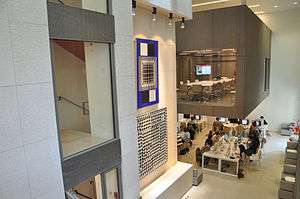
Founded in 1871, the nucleus of the school's research is the Bibliothèque de Sciences Po. The library offers a collection of more than 950,000 titles in the field of social sciences.
In 1982, the Ministry of National Education made the Bibliothèque the Centre for Acquisition and Dissemination of Scientific and Technical Information in the field of political science, and since 1994, it has been the antenna associated with the Bibliothèque Nationale de France.[75] The Bibliothèque de Sciences Po is also the main French partner in the International Bibliography of the Social Sciences, which is based at the London School of Economics.[76]
Founded in the 1950s, Presses de Sciences Po is the publishing house of Sciences Po. It publishes academic works related to the social sciences.[77]
Public lectures
Sciences Po organizes numerous public lecture events. Recent guest speakers have included Ban Ki-moon, General David Petraeus, Condoleezza Rice, former President of Brazil Luiz Inácio Lula da Silva, Eric Schmidt, Joseph Stiglitz, Sheryl Sandberg, Mario Draghi, UNESCO Director-General Irina Bokova and Harvard University professor Michael Sandel.[78][79][80]
Since 2007 it has organized the Franco-British Dialogue Lecture Series in collaboration with the LSE and the French Embassy in London. The lectures are held every term at the LSE's European Institute.[81][82]
Rankings and reputation
Rankings
Sciences Po ranked 2nd in Politics & International Studies in the QS World University Ranking in 2020, right behind Harvard, and is thus the number one university in the field in Europe. Sciences Po is also the number one French university in Social Policy & Administration and in Sociology, 2nd in Development Studies and Law & Legal Studies, and 3rd in Economics & Econometrics.[83]
| Year | 2014 | 2015 | 2016 | 2017 | 2018 | 2019 | 2020 |
|---|---|---|---|---|---|---|---|
| Global ranking | |||||||
| Global ranking | 214 | 222 | 223 | 220 | 220 | 221 | 242 |
| By field | |||||||
| Social Sciences & Management | – | – | – | 62 | 67 | 69 | 59 |
| Arts & Humanities | – | – | – | 154 | 207 | 176 | 170 |
| By subject | |||||||
| Politics & International Studies | 13 | 5 | 4 | 4 | 4 | 3 | 2 |
| Social Policy & Administration | – | – | 40 | 51–100 | 48 | 22 | 23 |
| Sociology | 36 | 51–100 | 50 | 44 | 37 | 28 | 28 |
| Development Studies | – | 51–100 | 51–100 | – | 51–100 | 51–100 | 40 |
| Law & Legal Studies | 51–100 | 51–100 | 51–100 | 51–100 | 51–100 | 51–100 | 50 |
| Economics & Econometrics | 101–150 | 101–150 | 51–100 | 101–150 | 101–150 | 101–150 | 51–100 |
| History | – | – | 101–150 | 51–100 | 51–100 | 101–150 | 101–150 |
| Philosophy | – | – | – | – | – | – | 151–200 |
| Modern Languages | – | 151–200 | 201–250 | 251–300 | 201–250 | 201–250 | 201–250 |
| Accounting & Finance | – | – | – | – | – | 201–250 | 201–250 |
Reputation and criticism
Sciences Po is broadly perceived as an elite institution.[84][85][86] It has educated, among others, 32 heads of state or government, 7 of the past 8 French Presidents, 3 past heads of the International Monetary Fund, heads of international organizations (including the UN, UNESCO, WTO, IMF, EP and ECB), and 6 of sitting CAC 40 CEOs. In recent years, however, Sciences Po's concerted efforts, at times controversial, to promote social inclusion in higher education have taken center stage. Central to Sciences Po's policy to diversify its student body is the Equal Opportunity Programme, launched in 2001.[87]
The school has been criticized, along with the École nationale d'administration, for creating in France an oligarchy of '...blinkered, arrogant and frequently incompetent people.'[88] The academic Gilles Devers criticized the institution for being the "base of the conservatism, and the mold of the molluscs that make the public elite" where "dissenting ideas are only admitted if they strengthen the system".[89]
Critics have accused Sciences Po of prioritizing access to professional networks over education and expertise.[90][91] As a result, the school is often nicknamed "Sciences Pipeau" (pronounced and sometimes spelled "Sciences Pipo", "pipeau" meaning "scam" in colloquial French[92]).[93][94] This nickname has also been employed by students.[95][96][97] The sociologist Nicolas Jounin, alumnus of Sciences Po, stated that the school is an "intellectual imposture" and a "financial hold-up".[98] The journalist at France Culture Guillaume Erner stated that the institution is "only advertisement and artifice".[99]
Sciences Po has also been accused of being unduly helped by the media. "Almost every French newspaper is run by an alumnus of Sciences Po", and most of the journalists in France are alumni from Science Po, so it would give the school "an unparalleled media coverage" and permit it to "cultivate a culture of secrecy" about its internal affairs.[100][101] "Sciences-Po is under-criticized," analyzes a professor. Former students are unlikely to criticize it. "Those who teach there have no interest, and not necessarily the urge, to do so. Those who are not there can hope to be there one day."[101] The journalist Ariane Chemin stated in 2013 that, because so many journalists come from Sciences Po, the school has an unduly good public reputation.[102]
The institution is partly state-funded, and some, especially institutes of political studies in the provinces, have accused it of receiving a disproportionate share of public money. In 2012, for example, Sciences Po Lille student representatives called Sciences Po (Paris) the "coronation of State inequity".[103]
Controversies
Political and financial scandals
Alain Lancelot, director of Sciences Po from 1987 to 1996, was investigated for financial mismanagement by the French Court of Audit.[104]
Since 1997, the institution has been hit by a number of scandals, notably concerning the leadership of Richard Descoings, its director from 1997 to 2012.[105][106][107]
Descoings, president from 1997 to 2012, had been criticized for offering large sums of money (through salary rise, free accommodation, etc.) to diverse members of staff, including his wife, in spite of the fact that Sciences Po is partly stately funded.[108]
In February 2012, it was revealed that an inspector of the French Court of Audit, in charge of investigating the financial behaviour of Sciences Po, was at the same time employed by Sciences Po.[109]
On 3 April 2012, Descoings was found dead in his Manhattan luxury hotel room during a trip where he was representing Sciences Po in New York. The police initially concluded that his death had been caused by an overdose,[110] but the final coronary report eventually stated that he died a natural death.[111] Descoings' energy on this last day and the missing phones and computer have raised questions as to the precise circumstances of his death.[112]
In October 2012, the Court of Audit reprimanded Sciences Po for financial mismanagement, accusing it of opaque remuneration procedures, unwarranted expenses claims and excessive pay-rises for managers.[113] The Court noted that the university's complex legal status – a public university managed by a private trust – had contributed to dysfunction and waste. It also criticized the French government for increasing state funding for the university without insisting on additional public oversight.[114][115] Sciences Po has also been accused to prevail results over morals.[116]
In November 2012, the government dismissed Hervé Crès, Sciences Po's interim director, but he sought the school's permanent presidency all the same, reasoning that Alain Lancelot and Richard Descoings, former Sciences Po presidents, had also been reprimanded by the Court of Audit and yet performed well in their management of the school.[117]
In July 2015, Jean-Claude Casanova, the former president of the Foundation Nationale des Sciences Politiques, the private trust which manages Sciences Po, was fined €1500 for failing to properly consult the Foundation's Administrative Council over budgeting decisions involving public money. The Court of Financial and Budgetary Discipline eventually found Casanova guilty, but gave him a lenient sentence because the procedures had some part of regularity and because it was not customary in Sciences Po to follow all the financial rules.[118][119]
In February 2016, the Court of Audit noted that reforms had been made, but stated that greater transparency was still needed. Frédéric Mion, director of Sciences Po since 2013, defended the university's record and asked the judges to write their report again.[120][121]
Notable alumni and academics
Over 80 000 people have studied at Sciences Po. Throughout its history, a sizeable number of Sciences Po alumni have become notable in many varied fields, including political life, international organisations, multinational corporations, academic research, as well as in the media and art world.
Politics
Six of the eight presidents of the French Fifth Republic have attended Sciences Po, including Georges Pompidou, François Mitterrand, Jacques Chirac, Nicolas Sarkozy (who did not graduate), François Hollande, and Emmanuel Macron.[122] Eighteen French prime ministers, including Pierre Mendès France, Michel Debré, Maurice Couve de Murville, Jacques Chaban-Delmas, Raymond Barre, Laurent Fabius, Michel Rocard, Édouard Balladur, Alain Juppé, Lionel Jospin, Dominique de Villepin, and Édouard Philippe among others. In total, since the foundation of the Fifth Republic, over 60% of France's prime ministers have been educated at Sciences Po.
The current French government includes a number of Sciences Po graduates, including Florence Parly, Bruno Le Maire, and Jean-Michel Blanquer. According to a study published in Le Monde, 14% (81 of the 577) of French members of parliament elected in 2017 were Sciences Po graduates, the most represented university in the National Assembly.[123]
Over 20 other international leaders have been educated at Sciences Po. This number includes Chandrika Kumaratunga, President of Sri Lanka; Sir Austen Chamberlain, British Foreign Secretary and 1925 Nobel Peace Prize laureate; Pierre Trudeau, Prime Minister of Canada; Prince Rainier III of Monaco; Pierre Werner, Prime Minister of Luxembourg; Esko Aho, Prime Minister of Finland; Salomé Zourabichvili, President of Georgia; José Socrates, Prime Minister of Portugal.[124][125]
International organisations and diplomacy
Sciences Po has also educated a considerable number of diplomats and actors in international organisations, including Simone Veil, former President of the European Parliament; Boutros Boutros-Ghali, former UN Secretary General; Pascal Lamy, former Director-General of the World Trade Organisation; Michel Camdessus and Dominique Strauss-Kahn, former presidents of the International Monetary Fund;[126] Jean-Claude Trichet, former President of the European Central Bank.
Senior French diplomats including François Delattre (currently Permanent Representative of France to the UN),[127] Gérard Araud (former ambassador to the USA),[128] Sylvie Bermann (currently ambassador to Russia),[129] Bernard Émié (currently Director of the DGSE),[130] Jean-Maurice Ripert (currently ambassador to China)[131] and Maurice Gourdault-Montagne (currently ambassador to China)[132] are also alumni.
Business and finance
Among the alumni are CEOs of France's forty largest companies (CAC 40) (Frédéric Oudéa of banking group Société Générale, Michel Bon of France Télécom and Carrefour, Jean-Cyril Spinetta of Air France, Serge Weinberg of PPR, Gérard Mestrallet of Suez, Philippe Camus of Alcatel-Lucent, Bertrand Puech of the Hermès Group, Louis Schweitzer of Renault, Jean-Marc Espalioux, CEO of Accor ). As well as CFO's of CAC 40 companies such as Frédéric Lemoine of Capgemini, Thierry Moulonguet of Renault. Sciences Po alumni also include CEO's of F500 companies such as Hubert Joly of Best Buy. As well as regional CEO's such as Clara Gaymard, President and CEO of GE France and VP of GE International or Slawomir Krupa CEO of Société Générale Americas.
Alumni in the financial sector include private sector bankers such as the founder of Rothschild & Co David René de Rothschild, CEO of Lazard Italy Gerardo Braggiotti , the CFO of Morgan Stanley Europe Jean-Hugues Bittner, former chairman and CEO of Lazard Michel David-Weill, the Director of Credit Suisse World, Co-founder, Chairman and CEO of TradingScreen Philippe Buhannic, former Chief Economist for Latin America at BBVA Javier Santiso, the Chairman of Credit Suisse Europe Jean-François Roussely , Global Head of M&A of Lazard Matthieu Pigasse and CEO of Lazard France Jean-Louis Girodolle among others. Public sector alumni also include the former President of the European Central Bank and Governor of the Bank of France Jean-Claude Trichet, the former head of the European Federation of Businesses, Industries and Employers and head of the French Businesses and Employers Union Laurence Parisot, among many others.
Literature and arts
Influential cultural figures, such as the writer Marcel Proust, the founder of the modern olympics Pierre de Coubertin, fashion designer Christian Dior, author Leïla Slimani, author Emmanuel Carrère, Harvard University Professor Stanley Hoffman, former Le Monde editor Jean-Marie Colombani also graduated from Sciences Po.[133]
Academia
Sciences Po is known for recruiting many former or current professionals to teach courses, allowing students to benefit from practitioners and their unique insights on current issues. Many high ranking civil servants give lectures alongside their daily job, at the beginning of the evening. Adjunct professors include former French Prime Minister Dominique de Villepin, former WTO director-general Pascal Lamy, former French President Francois Hollande, former French Prime Minister Jean-Pierre Raffarin, former French foreign minister Hubert Védrine, noted historian Pierre Milza,[134] Nobel Prize Laureate economist Joseph Stiglitz, and former Economics Minister and Ex-Managing Director of IMF Dominique Strauss-Kahn.[135] The philosopher, anthropologist and sociologist Bruno Latour has been teaching at Sciences Po since 2006.[136] Emmanuel Gaillard also teaches at the Law School.[137] The Sciences Po Paris School of International Affairs (PSIA) was founded by former Lebanese Minister of Culture Ghassan Salamé, who was succeeded by former Italian Prime Minister Enrico Letta. Other notable faculty members include economist Yann Algan and former French Minister of Culture Aurélie Filippetti.
Directors
- 1945–47 : Roger Seydoux
- 1947–79 : Jacques Chapsal
- 1979–87 : Michel Gentot
- 1987–96: Alain Lancelot
- 1997–2012: Richard Descoings
- 2012: Hervé Crès (interim)
- 2012–13: Jean Gaeremynck (interim)
- 2013–present: Frédéric Mion
See also
References and notes
Notes
- "Sciences Po rejoint la Conférence des grandes écoles".
- "Les membres de Couperin", Couperin.org (in French), Paris, retrieved 12 July 2018
- "Sciences Po Paris". CGE (in French). Retrieved 10 December 2019.
- "Emile Boutmy, l'inventeur de Sciences Po, modèle du défunt Richard Descoings".
- "Politics & International Studies". Top Universities. 15 February 2019. Retrieved 17 February 2020.
- Editors, F. P. "The Best International Relations Schools in the World". Foreign Policy. Retrieved 25 April 2020.CS1 maint: extra text: authors list (link)
- "Disciplinary and Multidisciplinary knowledge | Sciences Po Undergraduate College". 10 February 2017.
- "Politics & International Studies". Top Universities. 5 March 2020. Retrieved 5 March 2020.
- "Sciences Po 1945–1979" Centre d’histoire de Sciences Po Archived 12 October 2005 at the Wayback Machine
- Nord, Philip (2002). The Jacobin Legacy in Modern France: Essays in Honour of Vincent Wright. Oxford: Oxford University Press. p. 116. ISBN 9780199256464. Retrieved 30 May 2017.
- LSE: A History of the London School of Economics and Political Science, 1895–1995. Oxford University Press. 1 June 1995. p. 73. ISBN 9780198202400. Retrieved 11 August 2018.
- Paris, Sciences Po, FNSP 27 rue Saint Guillaume 75007. "Home". Sciences Po Stories.
- "Reform of the civil service". Archived from the original on 13 August 2015.
- Nord, Philip (2002). The Jacobin Legacy in Modern France: Essays in Honour of Vincent Wright. Oxford: Oxford University Press. p. 138. ISBN 9780199256464.
- Nord, Philip (2002). The Jacobin Legacy in Modern France: Essays in Honour of Vincent Wright. Oxford: Oxford University Press. p. 141. ISBN 9780199256464.
- Devine, Summerfield (1998). International Dictionary of University Histories. Chicago: Fitzroy Dearborn Publishers. p. 147. ISBN 9781134262175. Retrieved 29 May 2017.
- "Le statut juridique de Sciences Po: la dualité FNSP et IEP de Paris" Centre d'histoire de Sciences Po
- Nord, Philip (2002). The Jacobin Legacy in Modern France: Essays in Honour of Vincent Wright. Oxford: Oxford University Press. p. 117. ISBN 9780199256464.
- Noack, Rick (29 October 2014). "7 countries where Americans can study at universities, in English, for free (or almost free)". The Washington Post. ISSN 0190-8286. Retrieved 5 October 2017.
- "Sciences Po ― an elite institution's introspection on its power, position and worth in French society" NYU Department of Journalism, 9 September 2003.
- Kahlenberg, Richard D. (13 September 2011). "An Affirmative-Action Success". The Chronicle of Higher Education Blogs: Innovations. Retrieved 5 October 2017.
- "In France, a Bastion of Privilege No More". The New York Times. 4 September 2011. ISSN 0362-4331. Retrieved 5 October 2017.
- Maillard, Benoît Floc'h et Matteo (16 January 2015). "Sciences Po Paris : 64% des admis viennent de province". Le Monde (in French). ISSN 1950-6244. Retrieved 9 October 2017.
- "Sciences-Po: bienvenue à la Cour du roi Richard!".
- "Sciences-Po: un "new management" version "management de la peur"".
- "Sciences Po: la Cour des comptes accable Descoigns". 8 October 2012.
- Brafman, Nathalie (2 March 2013). "Un pur produit de l'élite française pour Sciences Po". Le Monde (in French). ISSN 1950-6244. Retrieved 21 June 2017.
- "Sciences Po ouvre une "École des affaires publiques"". Le Figaro Etudiant (in French). Retrieved 21 June 2017.
- magazine, Le Point (3 October 2016). "Sciences Po va ouvrir son "école du management et de l'innovation"". Le Point (in French). Retrieved 21 June 2017.
- Décret n° 2015-1829 du 29 décembre 2015 portant approbation des statuts de la Fondation nationale des sciences politiques, 29 December 2015, retrieved 21 June 2017
- "Une forte ambition, une gestion défaillante" (PDF). Cour des comptes. 22 November 2012.
- "L'hôtel de l'Artillerie va accueillir le futur campus de Sciences-po". Le Parisien. 14 May 2017. Retrieved 21 June 2017.
- "Paris: French students blockade prestigious Sciences Po university". 18 April 2018. Retrieved 9 July 2018.
- Sciences Po (12 May 2020). "Back to school 2020: A "dual campus" model". Retrieved 18 May 2020.
- "Collégiades : 7 campus en compétition | Sciences Po Collège universitaire". SciencesPo.fr. 7 June 2017.
- "Our campuses". Sciences Po. Retrieved 6 May 2017.
- "Le campus". Sciences Po and University of Toronto. Retrieved 6 May 2017.
- "Paris campus | Sciences Po Undergraduate College". 24 February 2017.
- "/ L'Hôtel de l'Artillerie – Sciences Po". sciencespo.fr.
- "Sciences Po achète l'Hôtel de l'Artillerie pour créer un campus dans Paris » VousNousIls". 17 June 2016.
- "Sciences Po se dote d'un grand campus au cœur de Paris". Les Échos. France. 17 June 2016.
- "L'hôtel de l'Artillerie, future vitrine pédagogique de Sciences po Paris".
- "Paris Promeneurs – L'hôtel de l'Artillerie Futur campus de Sciences Po". paris-promeneurs.com.
- "Dijon campus | Sciences Po Undergraduate College". 24 February 2017.
- "Le Havre campus | Sciences Po Undergraduate College". 24 February 2017.
- "Menton campus | Sciences Po Undergraduate College". 24 February 2017.
- "Nancy campus | Sciences Po Undergraduate College". 23 February 2017.
- "Poitiers campus | Sciences Po Undergraduate College". 24 February 2017.
- "Reims campus | Sciences Po Undergraduate College". 24 February 2017.
- "Undergraduate studies at Sciences Po".
- "Graduate studies at Sciences Po".
- "Graduate Studies at Sciences Po". Sciences Po. Retrieved 6 May 2017.
- "Home – Sciences Po Research". sciencespo.fr. 3 December 2014.
- "Research at Sciences Po in 2015".
- "Research Centers – Sciences Po Research". sciencespo.fr. 20 June 2014.
- INA. "Médialab de Sciences Po : cartographier le web pour les sciences sociales / E-dossier de l'audiovisuel : sciences humaines et sociales et patrimoine numérique / E-dossiers de l'audiovisuel / Publications / INA Expert – Accueil – Ina". ina-expert.com.
- "OFCE About..." ofce.sciences-po.fr.
- "Research Units – Sciences Po Research". sciencespo.fr. 10 March 2015.
- "Page d'accueil – Sciences Po liepp". sciencespo.fr.
- "What is LIEPP? – Sciences Po liepp". sciencespo.fr. 23 September 2014.
- "Page d'accueil – Sciences Po dime-shs". sciencespo.fr.
- "MaxPo – About the Center". maxpo.eu.
- "Cross-cutting Programmes – Sciences Po Research". sciencespo.fr. 6 October 2014.
- "Search Best Universities and Business Schools Globally 2017/2018". masterstudies.com. Retrieved 5 October 2017.
- "Alliance Program". alliance.columbia.edu.
- "Alliance Program – Columbia Global". beta.global.columbia.edu.
- "Support Alliance – Alliance Program". alliance.columbia.edu.
- "OxPo (Oxford-Sciences Po Programme) – Centre – Research". University of Oxford.
- "OxPo About – OXPO – Centre – Research". University of Oxford.
- "Sciences Po/Princeton Collaborative Research Grants 2017 – Sciences Po Département d'histoire". sciencespo.fr. 5 December 2016.
- University, Princeton. "Sciences Po – International Princeton". princeton.edu.
- "GPPN Mission". 21 October 2009.
- "Global Public Policy Network" (PDF).
- "Global Public Policy Network (GPPN)". Global Public Policy Network (GPPN).
- "Sciences Po Paris Overview: Introducing Sciences Po" Sciences Po Website, 2001.
- "IBSS Boosts Coverage of French Social Science Journals", IBSS, 2005.
- "Presses de Sciences Po", Sciences Po Website, 21 October 2004.
- "Sciences Po: France's Leading University in the Social Sciences".
- "Justice: A lecture and discussion with Harvard Professor Michael J. Sandel – Sciences Po School of Public Affairs". sciencespo.fr. 6 April 2016.
- "Irina Bokova – Guest speaker at PSIA – Sciences Po psia". sciencespo.fr. 7 April 2015.
- Haas, Annette. "LSE and Sciences Po – Academic partners – Academic Partnerships – Services and divisions – Staff and students – Home". London School of Economics.
- Lane, Philippe (8 July 2011). Franco-British Academic Partnerships: The Next Chapter (1 ed.). Liverpool: Liverpool University Press. p. 12. ISBN 9781781386569. Retrieved 23 May 2017.
- "Sciences Po". Top Universities. 9 December 2012. Retrieved 6 March 2020.
- Conley, Marjorie (9 September 2003). "Sciences Po ― an elite institution's introspection on its power, position and worth in French society". Portfolio, The Journalism of Ideas. New York University. Retrieved 10 August 2016.
- Koh, Aaron (2016). Elite Schools: Multiple Geographies of Privilege. New York; Oxon: Routledge. p. 193. ISBN 978-1--138-77940-2.
- Guttenplan, D.D. (4 May 2001). "In France, a Bastion of Privilege No More". The New York Times. Retrieved 10 August 2016.
- "In France, a Bastion of Privilege No More". The New York Times. 4 September 2011. ISSN 0362-4331. Retrieved 9 October 2017.
- Lichfield, John (17 May 2013). "Liberte, inegalite, fraternite: Is French elitism holding the country back?". The Independent. Retrieved 10 August 2016.
- "Sciences-Pipeau : Plus rentable que de braquer une banque ! – Actualités du droit". lesactualitesdudroit.20minutes-blogs.fr.
- BEAUVAIS, Anne-Sophie; CAUCHY, Pascal (19 January 2017). Sciences Po pour les Nuls. edi8. ISBN 9782412024003 – via Google Books.
- "L'école de l'élite : Sciences Pipo ? du 05 mars 2013 - France Inter".
- "pipeau – Traduction en anglais – exemples français – Reverso Context". context2.reverso.net.
- "sciences pipeau". Google Scholar.
- Tabellion, Elsa (21 March 2017). "Sciences Po déçoit-il ses élèves de 1ere année ?". Le Monde.
- Fabre, Benjamin (6 April 2015). L'art de pipoter: Se faire des amis et triompher en société : mode d'emploi. Éditions Tut-tut. ISBN 9782367040745 – via Google Books.
- Brunel, Manuel de guérilla à l'usage des femmes, p. 29.
- "Mon avis sur Sciences Po : "On en sait un peu sur tout, mais on ne sera jamais expert"".
- Nicolas Jounin, in Il est temps d'en finir avec Sciences Po !
- "Les comptes de Sciences Pipo". 9 October 2012.
- "Ce qui ne se dit jamais sur Sciences-Po et les médias..."
- "Sciences-Po: une stratégie de communication qui élimine les questions gênantes".
- Ariane Chemin in France Inter, L'école de l'élite : Sciences Pipo ?
- "Sciences Po : le sacre de l'Etat inégalitaire".
- "Sciences Po : la Cour des comptes demande des poursuites".
- "Dossier: Sciences-Po, la fuite en avant et les scandales – Mediapart".
- "La dérive financière de Sciences Po et la complaisance de l'État". 12 October 2012.
- "La dérive financière de Sciences Po et la complaisance de l'État". Contrepoints. 12 October 2012.
- "Les dirigeants de Sciences-Po touchent des superbonus".
- "Quand Sciences-Po salarie son contrôleur".
- "Cops Believe French Scholar Accidentally Overdosed". Archived from the original on 13 September 2016.
- "Richard Descoings est mort". Le Monde. 30 May 2012.
- Mullen, Jethro. "French educator found dead in New York was dynamic, controversial figure". CNN.
- "Educpros : actualités et services pour les professionnels de l'éducation. – Educpros.fr" (PDF). blog.educpros.fr. Archived from the original (PDF) on 28 August 2016. Retrieved 27 August 2016.
- comptes, Cour des. "Sciences Po : une forte ambition, une gestion défaillante / Archives / Actualités / Accueil / Cour des Comptes – Cour des comptes". ccomptes.fr. Archived from the original on 26 August 2016.
- Floc'h, Benoît (8 July 2012). "La Cour des comptes fustige la gestion de Sciences Po". Le Monde.
- "Document : la réponse de Sciences-Po à la Cour des comptes".
- "Sciences Po : l'Etat repousse la nomination d'Hervé Crès". Archived from the original on 28 August 2016.
- "Scandale des salaires à Sciences Po : Jean-Claude Casanova renvoyé devant la Cour de discipline budgétaire". Le Monde. 24 July 2015.
- Floc'h, Benoît (4 December 2015). "Jean-Claude Casanova condamné dans l'" affaire Sciences Po "". Le Monde.
- Décodeurs, Les (10 February 2016). "Ce qu'il faut retenir du rapport de la Cour des comptes 2016 en 7 graphes". Le Monde.
- "Prise de bec entre la Cour des comptes et Sciences-Po".
- Zerouala, Faïza (11 May 2012). "A l'école des présidents de la Vème République". Le Monde.
- Le Foll, Clément (26 June 2017). "Les diplômés de grandes écoles surreprésentés à l'Assemblée nationale". Le Monde.
- "José Sócrates: Mais 1 ano em Paris" [José Sócrates: 1 more year in Paris] (in Portuguese). 1 June 2012.
- "L'ex-premier ministre portugais José Socrates mis en examen". Le Monde. 24 November 2014.
- "Biographie de Dominique Strauss Kahn". edubourse.com.
- "François Delattre, porte-voix de la France à l'ONU". Le Monde.
- D.C., Ambassade de France aux Etats-Unis – Washington. "L'Ambassadeur – France in the United States / Embassy of France in Washington, D.C." France in the United States / Embassy of France in Washington, D.C.
- Po, Alumni Sciences. "Manifestation Alumni Sciences Po : Dinner Debate with H.E Sylvie Bermann, French Ambassador to the UK". sciences-po.asso.fr.
- "Biographie de M. Bernard Emié, Ambassadeur de France en Algérie – La France en Algérie". Archived from the original on 25 April 2017.
- Mariana Grépinet (6 May 2012). "Portrait de François Hollande en jeune homme".
- "L'ambassadeur – La France en Chine". Archived from the original on 9 January 2017.
- "Alumni – Sciences Po International". sciencespo.fr. 4 February 2015.
- "Décès de Pierre Milza, un des plus grands professeurs de Sciences Po". Sciences Po (in French). Retrieved 7 March 2018.
- "Dans les coulisses de l'IEP Paris".
- "Bruno Latour – Sciences Po – MedialabSciences Po – Medialab". medialab.sciences-po.fr.
- DROIT, LE MONDE DU. "Emmanuel Gaillard élu professeur à l'Ecole de Droit de Sciences Po".
Bibliography
- Richard Descoings, Sciences Po. De la Courneuve à Shanghai, préface de René Rémond, Paris: Presses de Sciences Po, 2007 (ISBN 2-7246-0990-5)
- Jacques Chapsal, " L'Institut d'études politiques de l'Université de Paris ", Annales de l'Université de Paris, n° 1, 1950
- " Centenaire de l'Institut d'études politiques de Paris (1872–1972) ", brochure de l'Institut d'études politiques de Paris, 1972
- A Sciences-Po, les voyages forment la jeunesse, Monde Diplomatique, Février 2006
- Pierre Favre, Cent dix années de cours à l'École libre des sciences politiques et à l'Institut d'études politiques de Paris (1871–1982), thèse de doctorat, 2 volumes, 1986
- Gérard Vincent, Sciences Po. Histoire d'une réussite, Orban, Paris, 1987
- Marie-Estelle Leroty, L'Enseignement de l'histoire à l'École libre des sciences politiques et à l'Institut d'études politiques de l'Université de Paris de 1943 à 1968, mémoire de diplôme d'études approfondies dirigé par Jean-François Sirinelli, Institut d'études politiques de Paris, 2000
- Anne Muxel (direction), Les Étudiants de Sciences Po, Paris: Presses de Sciences Po, 2004, ISBN 2-7246-0937-9: Résultats d'une grande enquête menée en janvier 2002 auprès des élèves par le Cevipof
- Comité national d'évaluation des établissements publics à caractère scientifique, culturel et professionnel, Rapport d'évaluation de l'Institut d'études politiques de Paris, Septembre 2005
- Cyril Delhay, Promotion ZEP. Des quartiers à Sciences Po, Paris: Hachette, 2006, ISBN 2-01-235949-3
External links
| Wikimedia Commons has media related to Institut d'études politiques de Paris. |
- Sciences Po (FNSP and IEP Paris) official English-version website
- Histoire@Politique (journal published by the IEP-Paris)
- In France, a Bastion of Privilege No More New York Times, September 2011
.jpg)
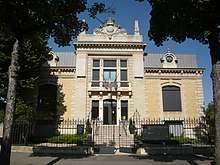
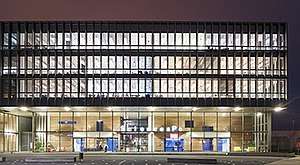
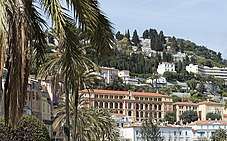
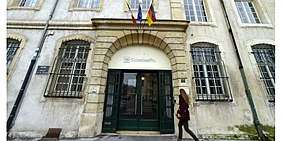
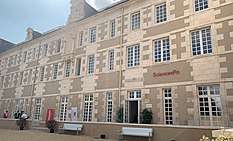
.jpg)
_(cropped).jpg)
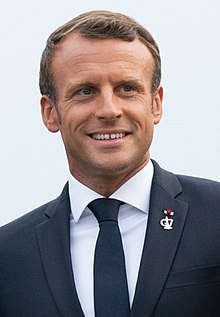
.jpg)

.jpg)
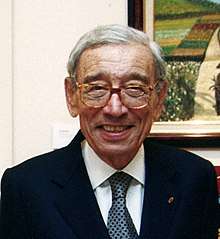
.jpg)
.jpg)
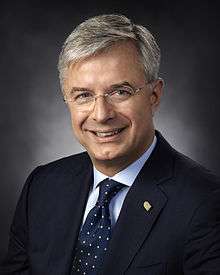
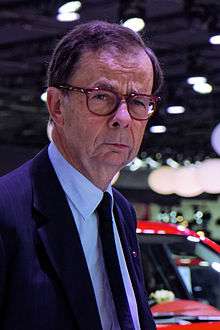
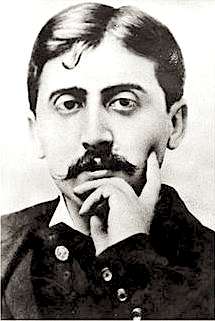
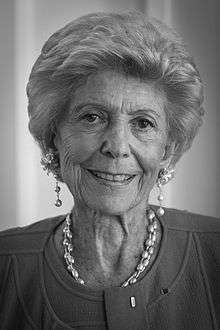
.jpg)
